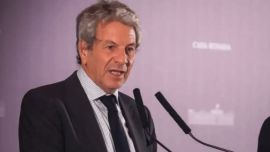United States Speaker of the House Nancy Pelosi doubts Republicans in Congress would force a government shutdown in retaliation to the impeachment inquiry, she said Friday.
“They don’t care about shutdowns because they don’t believe in government, however I do think that they learned a lesson from the last shutdown since it didn’t do them very well,” she said of the White House during a roundtable with Bloomberg reporters and editors.
The government is operating on a temporary funding measure that expires November 21. As lawmakers haggle over a spending plan, congressional Democrats and the White House are at odds over the same issue -- Trump’s demand for border wall spending -- that was at the root of a 35-day government earlier this year. That ended with the Trump administration agreeing to a funding bill without the extra money he sought.
Pelosi said that she and Senate Majority Leader Mitch McConnell are trying to come to an agreement on the full-year spending bills, including how to resolve the border wall spending. Ideas on the table include the passage of a stopgap bill January or February in order to move spending debates past the House impeachment process, which is set to drag out into December.
Discussions covered more than just the ever-present question of impeachment, though.
Prescription drugs
Pelosi said she thinks a deal to lower the cost of prescription drugs is still possible.
Enactment of a major bill — seeking to limit what Medicare will pay and then pressuring drug companies to apply lower prices to the commercial market — could be a boon to consumers and put downward pressure on pharmaceutical company stock prices.
Negotiations on a drug price bill continue with the White House, she said, noting that Trump hasn’t threatened to veto her proposal, though the two haven't spoken since an October meeting over Syria policy devolved into Trump insulting Pelosi, who then walked out.
New NAFTA
Regarding the revised NAFTA agreement, in the works since Pelosi designated a group of Democrats earlier this year to negotiate changes with US Trade Representative Robert Lighthizer, she called it the “easiest trade deal that we’ve ever done.”
“I’d like to have it done as soon as it’s ready. I wouldn’t rule it out next year. Hopefully we can do it sooner, but I said: when it’s ready we’ll do it,” she said.
The tinkered deal should focus more on strengthening the labour and enforcement provisions.
“We have shared values. We have the same concerns” Pelosi said of Democrats and organised labour, though many labour groups so far have said the agreement isn't good enough.
Pelosi said Democratic negotiators and the Trump administration are close to making final fixes to the accord, adding that she believes the deal could serve as a template for future agreements if they get it right.
Key Senate Republicans have said that letting a vote on the U.S.-Mexico-Canada Agreement slip to a presidential election year could doom the deal altogether, and Senate Finance Chairman Chuck Grassley, the Republican who would be responsible for shepherding the deal through the Senate, has voiced concerns over the timeline, describing the Democrats’ approach to the negotiations as “stalling tactics.”
Trump administration officials have also become increasingly concerned that time is running out for a vote on the agreement this year and that it won’t be possible to consider it next year, people familiar with the internal deliberations said.
Bloomberg News reported earlier this week that the administration and Congress are still negotiating and have major differences on the language of the legislation that lawmakers will vote on, indicating another uphill battle.
'Not a big fan' of Medicare for all
The speaker advocates for “health care for all,” rather than the Medicare for All proposal embraced by some leading Democratic presidential contenders, and she believes it would be the wisest policy for the party as it seeks to defeat President Donald Trump in 2020.
Pelosi, who helped push the Affordable Care Act through Congress in 2010, said in a Bloomberg Television interview Friday that Medicare for All would cost too much and that it’s clear many Americans don’t want to lose their private health insurance plans.
“I welcome the debate. I think that we should have health care for all. I think the affordable care benefit is better than the Medicare benefit.”
Democrats should keep their focus on winning in the 2020 election, and that means promoting ideas that can draw wide support throughout the country, she said.
Pelosi made clear that her own preference is to improve on the Affordable Care Act, which has expanded health coverage for tens of millions of Americans through an expansion of Medicaid for the poor and private insurance that is sold through consumer exchanges.
China trade war
Finally, Pelosi challenged Trump on China, saying Democrats would be stronger on the issue by aligning with the European Union to bring additional pressure on the world’s second-largest economy.
Trump was correct to identify China’s aggressive trade policy as a threat to the US, she said, but she faulted his approach as ineffective and said he’s further hobbled the US. position by engaging in a trade conflict with the EU at the same time.
“We have leverage,” Pelosi said. “So, what did the president do? Alienate the EU by putting tariffs on them. So they’re now looking out for themselves vis-a-via us.”
Trump last year imposed sweeping tariffs on European steel and aluminum and has threatened to hit European car imports with a duty of up to 25 percent, arguing that they are a national security risk.
The US also imposed tariffs on $7.5 billion of EU goods, ranging from planes to spirits. The EU has pledged to hit back with its own tariffs, risking a further escalation of tensions.
She said the U.S. needs to be more “strategic,” moving trade policy beyond using tariffs as a primary weapon and instead engage allies like the EU that share US. interest as well as its complaints about China. The Trump administration has taken a mainly unilateral approach to the trade war with China, imposing tariffs on some $360 billion in imported Chinese goods to try to force economic reforms.
So far, though, it has had limited success, if any. While the tariffs have forced many companies to contemplate shifting supply chains out of China the Trump administration has yet to deliver the sort of comprehensive change in Chinese behaviour it has sought, instead, critics say, hurting US workers and farmers. Trump last month abandoned his push for a one-time and all-encompassing deal with Xi Jinping, his Chinese counterpart. He has instead opted to try to do it in phases, the first of which he wants to sign in the coming weeks.
--BLOOMBERG



















Comments